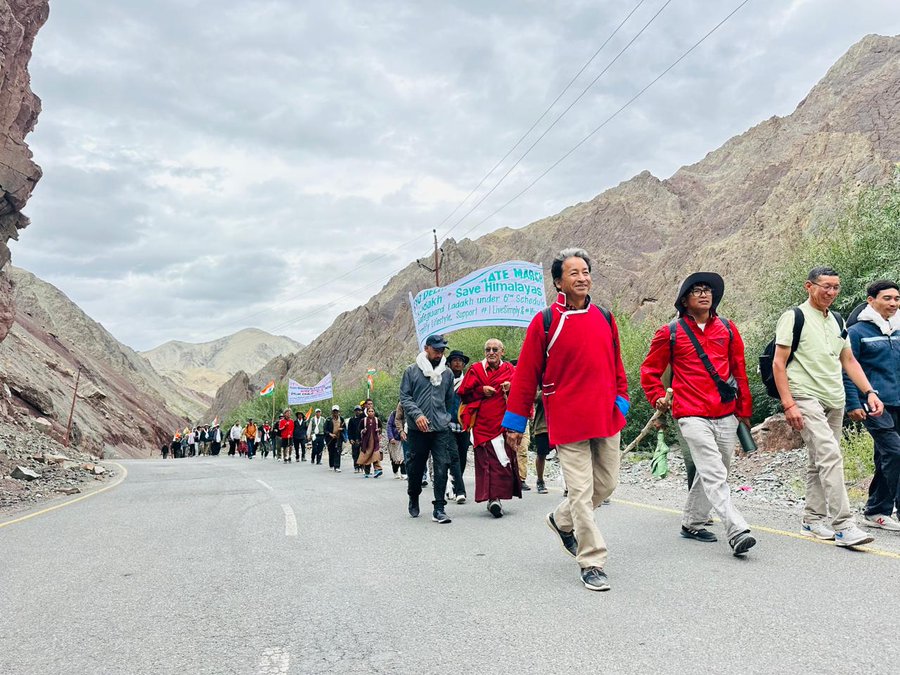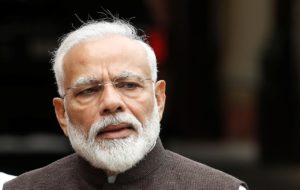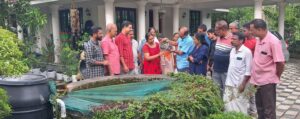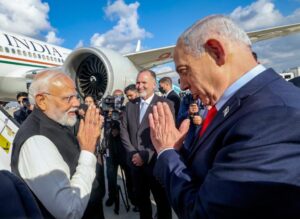Wangchuk Remains Undaunted: Wife Gitanjali Finally Meets Him In Jail

FILE PHOTO: Sonam Wangchuk and other 'padyatris' during their march from Ladakh to New Delhi in October 2024
In a poignant reunion, Ladakh activist Sonam Wangchuk’s wife, Gitanjali Angmo, finally met her husband face-to-face at Jodhpur Central Jail on the evening of October 7, Tuesday—their first in-person encounter since his arrest under the stringent National Security Act (NSA) following the violent protests in Leh on September 24.
After the meeting, Angmo shared her emotions on X (formerly Twitter), writing, “Met @Wangchuk66 today with @RitamKhare and got the detention order which we will challenge.” She highlighted Wangchuk’s unyielding resolve, adding, “His spirit is undaunted. His commitment resolute! His resilience intact! He conveys heartfelt thanks to all for their support and solidarity.” The visit marked a breakthrough, as Angmo had previously complained to media outlets like The Tribune that authorities had withheld the detention order and even stopped responding to her calls.
Wangchuk, a prominent climate activist and engineer, had been on a 35-day hunger strike demanding statehood for Ladakh and the extension of Sixth Schedule constitutional protections to safeguard the region’s fragile ecology and cultural identity. The protests turned violent on September 24, leading to four deaths, the torching of government vehicles and buildings, including a BJP office in Leh. Wangchuk called off his fast in the aftermath but was swiftly detained under the NSA and transported over 1,000 kilometers from Ladakh to Jodhpur, a move his supporters decried as punitive.
Authorities justified the detention, alleging that Wangchuk’s activism was “prejudicial to the security of the state time and again”—a charge rejected outright by his allies and independent observers, who view it as an attempt to suppress legitimate demands.
Prior to Angmo’s visit, Leh Apex Body legal adviser Mustafa Haji and Wangchuk’s elder brother, Tsetan Dorjey Ley, had met him on October 4. According to Wangchuk’s lawyer, the activist remains in high spirits and has reiterated his call for justice. “There should be an independent judicial inquiry into the killing of our four people and unless that is done I am prepared to stay in jail,” his lawyer quoted Wangchuk as having stated. He also urged supporters to maintain calm, saying, “Keep peace and unity and continue with our struggle peacefully—in the true Gandhian way of non-violence.”
The Leh Apex Body and Kargil Democratic Alliance have suspended dialogue with the Union government, insisting on preconditions: an impartial probe into the violence, the release of all detainees including Wangchuk, dropping of charges, and visible efforts by India to rebuild trust. They reject labels like “anti-national” or “separatist” for voicing regional aspirations.
Angmo’s jail visit followed closely on the heels of a Supreme Court hearing on her habeas corpus petition challenging the detention and seeking Wangchuk’s immediate release. The court issued notices to the Centre and Ladakh administration. Represented by senior advocate Kapil Sibal, Angmo pressed for transparency, arguing, “Without the grounds of detention, the detention order could not be challenged.” The bench, comprising Justices BR Gavai and KV Viswanathan, advised, “First, make a request, and if it’s rejected, then approach the court.”
In letters to President Droupadi Murmu and Prime Minister Narendra Modi, Angmo had denounced the arrest as a “witch-hunt” and condemned efforts to brand her husband’s peaceful activism and Ladakh’s movement as “anti-national.” Wangchuk’s case has galvanized national attention, spotlighting tensions over autonomy in the Union Territory.
The Supreme Court is set to hear the matter further on October 14, as Ladakh’s struggle for safeguards continues amid calls for dialogue and restraint.





